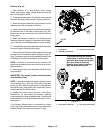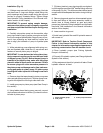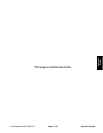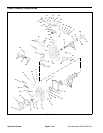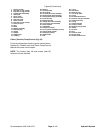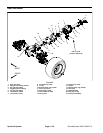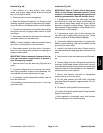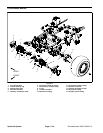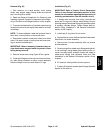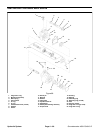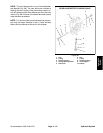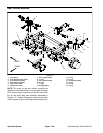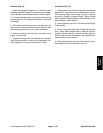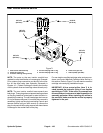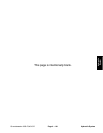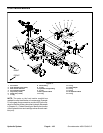
Groundsmaster 4000--D/4010--D Hydraulic SystemPage 4 -- 95
Removal (Fig. 67)
1. Park machine on a level surface, lower cutting
decks, stop engine, apply park ing brake and remove
key from the ignition switch.
2. Read the General Precautions for Removing and
Installing Hydraulic System Components at the begin-
ning of the Service and Repairs section of this chapter.
3. To prevent contamination of hydraulic system during
wheelmotor removal, thoroughly cleanexterior ofmotor
and fittings.
NOTE: To ease installation, label the hydraulic lines to
show their correct position on the wheel motor.
4. Disconnect hydraulic hoses and tubes from wheel
motor. Put caps or plugs on motor ports and hose open-
ings to prevent contamination.
IMPORTANT: Before loosening fasteners that se-
cure wheel motor, support motor to prevent it from
falling during removal.
5. Remove wheel motor using Figure 67 as a guide.
6. If hydraulic fittings are tobe removed fromwheelmo-
tor, mark fitting orientation to allow correct assembly.
Remove fittings from motor and discard O--rings.
Installation (Fig. 67)
IMPORTANT: Refer to Traction Circuit Component
Failure in the General Information section of this
chapter forinformation regarding the importance of
removing contamination from the traction circuit.
1. If fittings were removed from motor, lubricate and
place new O--rings onto fittings. Install fittings into port
openingsusingmarks made duringthe removalprocess
to properly orientate fittings. Tighten fittings (see Hy-
draulic Fitting Installation in the General Information
section of this chapter).
2. Install new O--ring (item 8) onto motor.
3. Align splines on motor shaft and splined brake shaft.
Slide motor into brake assembly.
4. Secure motor to brake assembly with cap screws
and flat washers.
5. Removeplugs fromwheel motorfittingsand hydraul-
ic line openings. Using labels placed during motor re-
moval, correctly attach hydraulic hoses and tubes to
wheel motor fittings (see Hydraulic Hose and Tube
Installation in the General Information section of this
chapter).
6. Fill reservoir with hydraulic fluid as required.
7. Properly fill hydraulic system (see Charge Hydraulic
System in this section).
Hydraulic
System



